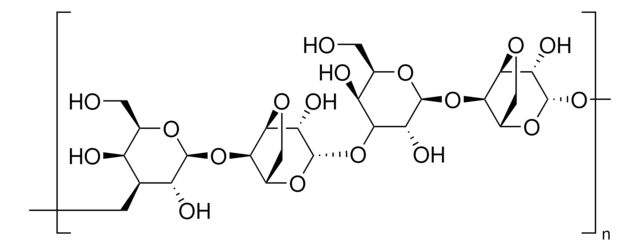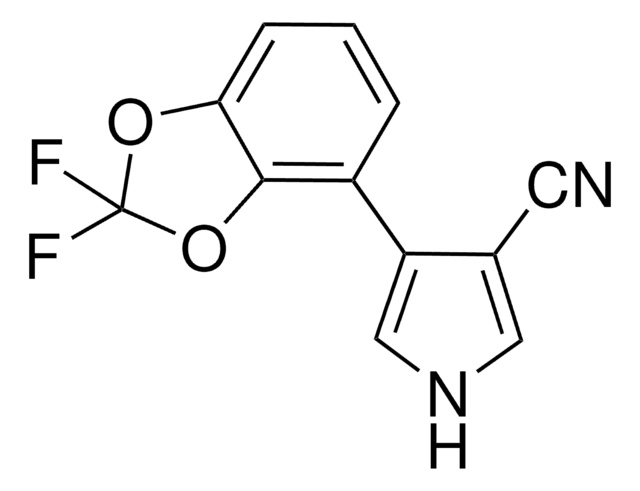56748
Imidazole
BioUltra, for molecular biology, ≥99.5% (GC)
Synonym(s):
1,3-Diaza-2,4-cyclopentadiene, Glyoxaline
About This Item
Recommended Products
grade
for molecular biology
Quality Level
vapor pressure
<1 mmHg ( 20 °C)
product line
BioUltra
Assay
≥99.5% (GC)
form
flakes
powder or crystals
impurities
DNases, none detected
RNases, none detected
insoluble matter, passes filter test
phosphatases, none detected
proteases, none detected
≤0.2% water
ign. residue (900 °C)
≤0.05%
pH
9.5-11.0 (25 °C, 0.1 M in H2O)
pKa (25 °C)
6.95
bp
256 °C (lit.)
mp
88-91 °C (lit.)
solubility
H2O: 0.1 M at 20 °C, clear, colorless
anion traces
chloride (Cl-): ≤50 mg/kg
sulfate (SO42-): ≤50 mg/kg
cation traces
Al: ≤5 mg/kg
As: ≤0.1 mg/kg
Ba: ≤5 mg/kg
Bi: ≤5 mg/kg
Ca: ≤10 mg/kg
Cd: ≤5 mg/kg
Co: ≤5 mg/kg
Cr: ≤5 mg/kg
Cu: ≤5 mg/kg
Fe: ≤5 mg/kg
K: ≤50 mg/kg
Li: ≤5 mg/kg
Mg: ≤5 mg/kg
Mn: ≤5 mg/kg
Mo: ≤5 mg/kg
Na: ≤50 mg/kg
Ni: ≤5 mg/kg
Pb: ≤5 mg/kg
Sr: ≤5 mg/kg
Zn: ≤5 mg/kg
SMILES string
c1c[nH]cn1
λ
0.1 M in H2O
UV absorption
λ: 260 nm Amax: 0.10
λ: 280 nm Amax: 0.10
InChI
1S/C3H4N2/c1-2-5-3-4-1/h1-3H,(H,4,5)
InChI key
RAXXELZNTBOGNW-UHFFFAOYSA-N
Looking for similar products? Visit Product Comparison Guide
Application
Other Notes
Signal Word
Danger
Hazard Statements
Precautionary Statements
Hazard Classifications
Acute Tox. 4 Oral - Eye Dam. 1 - Repr. 1B - Skin Corr. 1C
Storage Class Code
6.1C - Combustible acute toxic Cat.3 / toxic compounds or compounds which causing chronic effects
WGK
WGK 2
Flash Point(F)
293.0 °F - closed cup
Flash Point(C)
145 °C - closed cup
Personal Protective Equipment
Regulatory Listings
Regulatory Listings are mainly provided for chemical products. Only limited information can be provided here for non-chemical products. No entry means none of the components are listed. It is the user’s obligation to ensure the safe and legal use of the product.
EU REACH Annex XVII (Restriction List)
Choose from one of the most recent versions:
Already Own This Product?
Find documentation for the products that you have recently purchased in the Document Library.
Customers Also Viewed
Our team of scientists has experience in all areas of research including Life Science, Material Science, Chemical Synthesis, Chromatography, Analytical and many others.
Contact Technical Service








